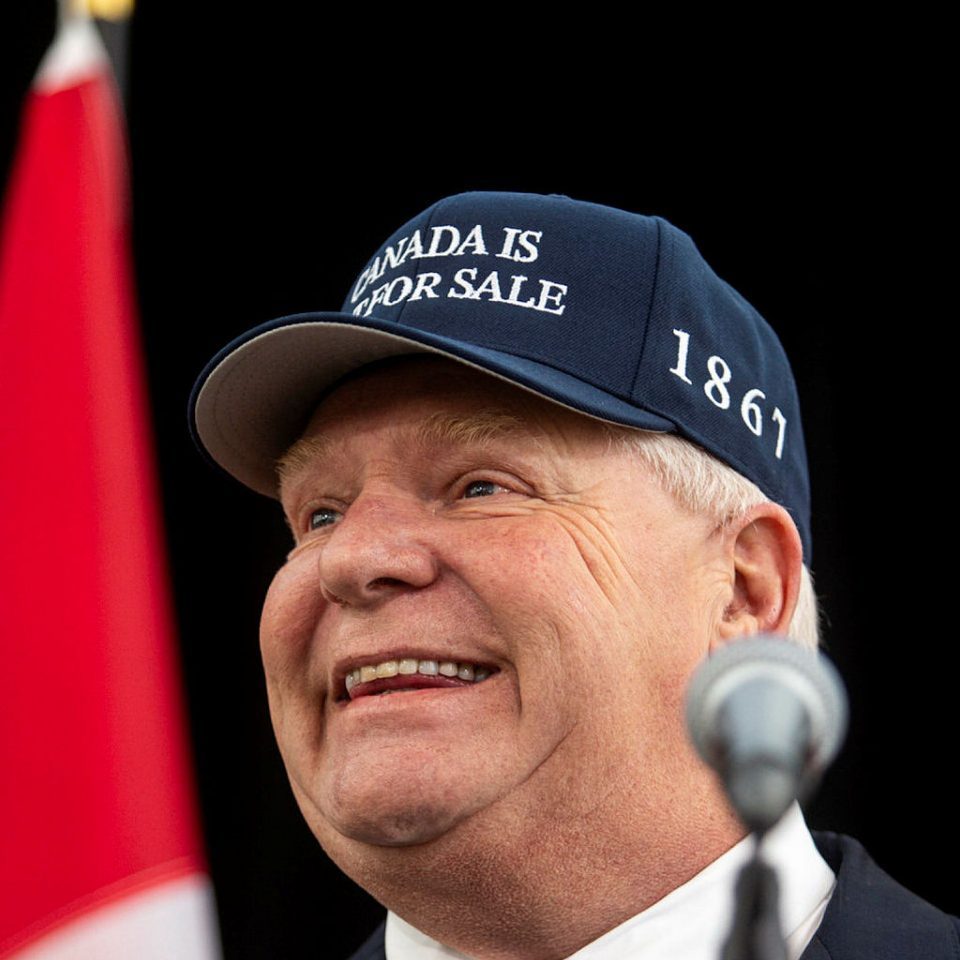The Team Canada Approach: How Federalism Shapes Canada’s Response to Trump’s Tariff War

Published in the Hill Times on March 24th, 2025
It is not clear yet whether it will be Carney or Pierre Poilievre who will lead Canada in the longer term. But one thing is for certain: whoever the prime minister is, their approach to multilevel governance and their relationships with the premiers will matter significantly.

Ontario Premier Doug Ford, pictured on Jan. 15, 2025, wearing a ‘Canada is Not For Sale’ hat at the first ministers’ meeting in Ottawa. Ford is poised to play a brokerage role among the premiers, which will help to take the pressure off Carney. But Ford is going to want to keep talking tough, maybe even tougher, writes Lori Turnbull. The Hill Times photograph by Andrew Meade
In his first trip as prime minister, Mark Carney went to the United Kingdom and France to sure up our European trade relationships while U.S. President Donald Trump wages a tariff war. Meanwhile, federal ministers Dominic LeBlanc and Melanie Joly are taking the lead in talks with American officials, including Trump’s Commerce Secretary Howard Lutnick. But they are not alone. A key member of Team Canada is Ontario Premier Doug Ford. Canada’s federal system of government has shaped our response to Trump’s tariff war and will continue to do so for as long as it lasts, though it might get more difficult to maintain national unity as times goes on.
Doug Ford has taken a leadership role ever since Trump started talking about tariffs. Back in November, when tariffs were still a threat rather than a reality, Ford took out a multi-million dollar ad buy in the U.S. to reinforce, among Americans, the importance of the Canada-U.S. trade relationship to their quality of life. He has made multiple appearances on CNN and Fox News. These efforts are designed to get through to the American public who, in turn, might be able to put pressure on Trump to reverse course.
It is no surprise that Premier Ford is front and centre in Canada’s efforts to negotiate with the U.S. He is the premier of Canada’s largest province. Almost 40% of Canadians live in Ontario and many of the threads that make up the Canada-U.S. integrated supply chain originate in Ontario, including the auto industry. Further, it would be remiss not to acknowledge that Ford’s own political aspirations stand to benefit if he claims the role of Captain Canada. He called an election a full sixteen months earlier than the scheduled date on the premise that he needed a strong mandate to deal with Trump. He secured a third consecutive majority mandate while traveling to Washington D.C. during the campaign, including with a delegation of all Canadian premiers.
Many have wondered whether Ford’s tough-talking interventions have helped Canada’s case or risked making things worse. He was described in a BBC publication as “blunt-speaking” and having “unusual” tactics in dealing with Trump but, clearly, he has gotten Trump’s attention. Ford was among the first provincial premiers to yank American booze off the shelves. He’s torn up a contract with Elon Musk’s Starlink, and he’s threatened to impose a 25% surcharge on electricity flowing to the United States – a move that enraged Trump and briefly led to an escalation in the form of threats of higher tariffs. But then temperatures cooled, and Ford got the meeting with Lutnick that he wanted in the first place.
There is an inevitability to the intergovernmental approach. As Prime Minister Carney has pointed out, we are not a single national economy in Canada. We have provincial and regional economies, all of which count on the United States as a major trading partner. Some provinces are more entwined with the United States than others and some, like Alberta, clearly have commodities that Trump wants. The longer the tariff war lasts, the more difficult it will be to maintain unity among the premiers. Clearly, Prime Minister Carney is charting a course for pivoting away from dependence on America, but this will take time and there will be no substitute for the U.S. among other potential trading partners. Premier Ford is poised to play a brokerage role among the premiers, which will help to take the pressure off Prime Minister Carney. But Ford is going to want to keep talking tough – maybe even tougher – and Alberta Premier Danielle Smith has been opposed to measures like stopping the flow of oil to the U.S. as that would paralyze Alberta’s provincial economy.
It is not clear yet whether it will be Mark Carney or Pierre Poilievre who will lead Canada in the longer term. But one thing is for certain: whoever the prime minister is, their approach to multilevel governance and their relationships with the premiers will matter significantly. A cooperative tone will be crucial to defend against Trump’s preference for a “divide and conquer” strategy. Without it, Canada will be in an even more vulnerable position than we are now.
Lori Turnbull is a Senior Advisor at the Institute on Governance.